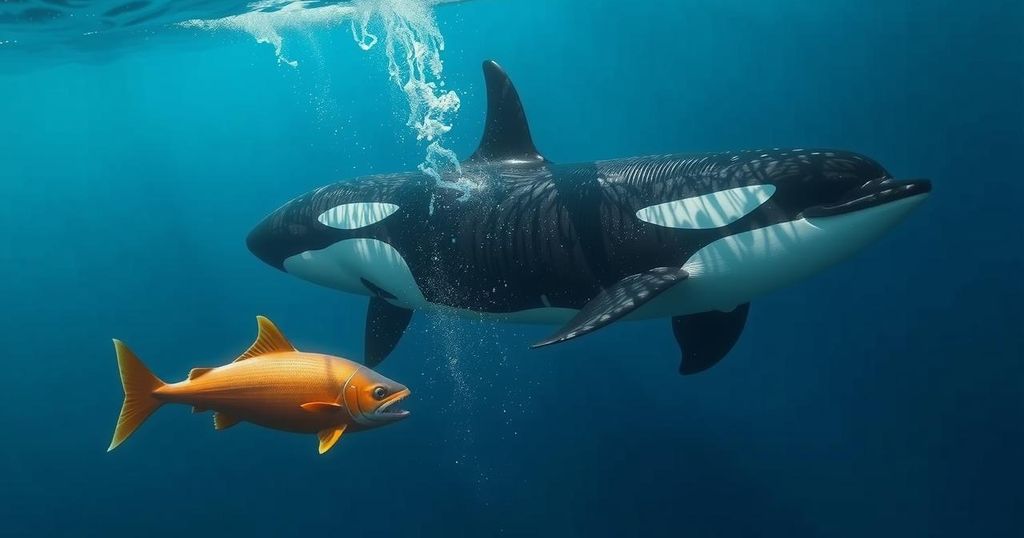Science
“ FRONTIERS IN MARINE SCIENCE, ASIA, AZTEC, CENTRO INTERDISCIPLINARIO DE CIENCIAS MARINAS, CNN, ENVIRONMENTAL IMPACT, ERIC, ERICK HIGUERA RIVAS, FISHING, FOSSIL DISCOVERY, FOSSILS, FRANCESCA PANCALDI, GULF OF CALIFORNIA, MEXICO, MOCTEZUMA, NORTH AMERICA, ORCA, PACIFIC OCEAN, PALEONTOLOGY, PANCALDI, PHILIPPINES, SCIENCE, WONDER THEORY
Amina Hassan
0 Comments
Orca Pod’s Ingenious Strategy to Hunt Whale Sharks Revealed in New Study
Researchers have documented orcas hunting whale sharks in the Gulf of California, demonstrating their sophisticated strategies. The study reveals how orcas use coordinated tactics to incapacitate these massive fish, providing new insights into their predatory behavior without adversely affecting whale shark populations.
In the majestic Pacific Ocean near Mexico, a clever pod of orcas has devised a unique strategy to hunt the colossal whale shark, the largest fish on Earth, reaching up to 18 meters in length. Marine biologists recently captured the intricate hunting techniques of these apex predators in a new study published in “Frontiers in Marine Science,” documenting four separate events of orca hunts through detailed imagery and video documentation. While the gentle whale sharks, typically measuring between 3 to 7 meters at the feeding sites in the Gulf of California, seem like formidable creatures, the orcas display remarkable teamwork that makes the hunt appear almost effortless.
With a brain as small as an egg relative to its massive body, the whale shark lacks any effective defense mechanism against the cunning orcas. Francesca Pancaldi, a marine researcher, explained that these gentle giants are slow-moving with tiny, ineffective teeth and can only flail about or dive deep when threatened. The documented hunting sessions were orchestrated by the orcas employing an elaborate tactic: striking the whale shark while using the element of surprise. Through a combination of forceful bumps and strategic positioning, they would flip the whale shark over, rendering it vulnerable and inducing a state of temporary paralysis known as tonic immobility.
As the video footage reveals, the orcas work in unison, striking from different angles and ultimately maneuvering the whale shark into an upside-down position where it becomes helpless. This sophisticated behavior highlights the intelligence of orcas in their role as apex predators and signifies a shift in their hunting preferences. The study also points toward their potential targeting of the whale shark’s nutrient-rich liver, although direct consumption was not observed. Sarah Teman, a scholar from the University of Washington, noted the excitement around this documented behavior, emphasizing its significance in understanding orca hunting dynamics.
By leveraging their social structures and techniques, orcas maintain their status as unparalleled hunters in the ocean. This newfound specialization toward elasmobranchs highlights how even apex predators evolve and adapt to their environments, carving out new ecological niches. While orcas have been known to hunt other species, like great white sharks, this illustrates a fascinating extension of their dietary repertoire.
Despite the orcas’ newfound hunting strategy, researchers assure that the whale shark population in the Gulf of California remains stable, with no detrimental ecological effects observed. The future may hold more discoveries as scientists explore how this specific pod fits into a broader understanding of orca ecotypes, especially given the unique nature of their hunting practices.
The hunting behavior of orcas, or killer whales, has fascinated marine scientists for decades. Known for their intelligence and social structures, orcas exhibit diverse hunting strategies depending on their ecological niche. This research sheds light on a specific orca pod in the Gulf of California that has adapted its hunting methods to target whale sharks, the largest fish in the ocean. The study documents behavior that has been only previously speculated upon, providing crucial insights into orca predation and the dynamics of marine ecosystems.
This groundbreaking study reveals the intricate hunting strategies that orcas employ when targeting whale sharks, showcasing their intelligence and social coordination. While the orcas effectively exploit this feeding opportunity, it does not appear to pose a threat to the overall whale shark population in the Gulf of California, indicating a complex dynamic in marine ecosystems. As we deepen our understanding of these apex predators, further research may reveal even more fascinating adaptations within orca ecotypes.
Original Source: edition.cnn.com




Post Comment